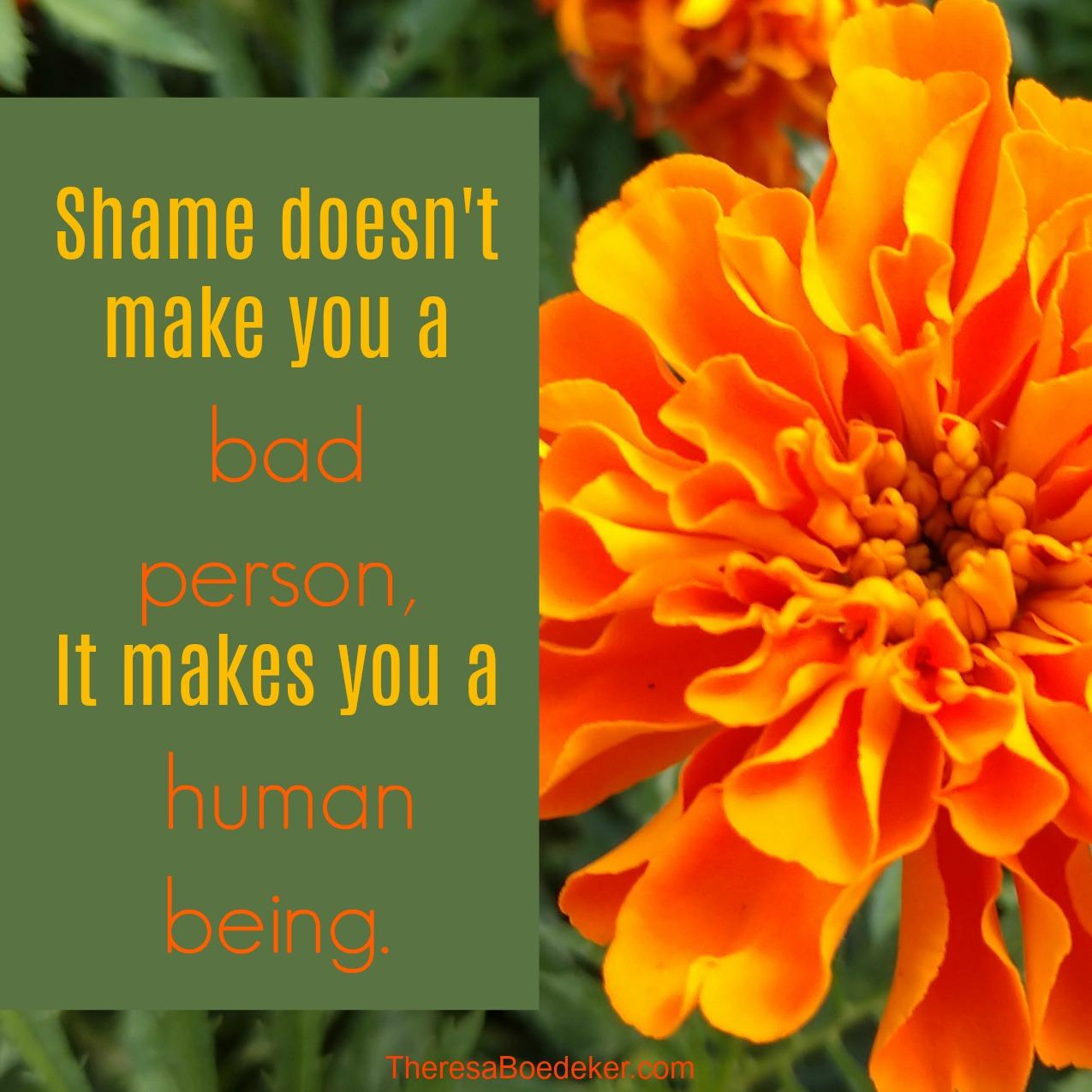To deal with shame and the lies it is telling us, learn the 4 ways that shame makes us feel. This is post 5 in a series on shame.
Shame. It’s an uncomfortable feeling we try to avoid.
It’s also a perfectly natural and normal emotion for us to experience.
Remember: Shame doesn’t make you a bad person, it makes you a human being.
Don’t feel bad if you have felt shame. It just means you have misinterpreted events or words and tied them to your identity. Which means you can untie yourself from these lies.
Shame can come and go and be triggered by certain events or words. Or it can seem like we are stuck in it.
Often our current shame has ties to old and past shame that follows us around like lint on our black pants. We don’t notice it’s there until we glance down and happen to see it. And then we wonder how long we have been going around with white lint dotting the side of our pants.
Shame is NOT something we want to dwell on. Often even think about.
Hey, I’m with you there. I’d rather be thinking positive thoughts or laughing with a friend.
But ignoring something never makes it go away. It keeps lurking in the background. Waiting for us to look down and notice it.
Which means we need to do the hard work of facing some not so pleasant emotions and experiences and get our hands dirty with some healing work. Some picking off of lint from our black pants.
Because we were created to walk in freedom.

I thought shame was a problem that others had. Boy was I wrong.
I didn’t think I had a problem with shame. Felt pretty shame free.
And then I started thinking about shame. Writing a post about shame (which turned into a series on shame). Processing a past event from 25 years ago with my counselor.
And I realized that shame was used as a motivator in my childhood. Still is a strong self-motivator. The fear of not wanting to experience the feelings of shame, can be a trigger point and causes me to still do all sorts of things.
- Like not ask for what I want or need. (I was raised to meet everyone else’s needs before my own.)
- Give up my needs for the needs of others, or the good of the group (I was raised to not be selfish. Not want much. Not ask, or you are nagging.)
- Keep my mouth shut. Not say what I think if it will rock the boat or not fit in with what others believe. (I was raised to believe conflict is bad.)
- Think something is wrong with me if I do something wrong. (Cultish religion helped cement this fact.)
- Find worth in what I do, or accomplish, instead of who I am. (I was praised more for what I did, than who I was.)
- Please others to my detriment. (Better to give than receive.)
- Expect very little (With 5 siblings I was always giving up what I wanted for the greater good).
- Hide my true self so people would like me. (I didn’t want to be like those difficult people my mom mentioned in her lectures.)
- Think something is wrong with me when I don’t fit in or mesh with others (like being a night owl among early birds). (I was raised not to know myself, but to know what others needed and wanted.)
So yes, I’m believing some of the lies of shame about my identity and who I am.
Maybe you can relate.
Maybe shame, or trying to avoid shame from the lies it whispers about who you are, is a motivator in your life.
Maybe the old lies of shame learned years ago are still influencing your actions and choices today. Maybe your identity was shaped by the lies of shame.
And maybe it’s because you were raised in an environment that promoted shame. Like I was.


We are not here to blame and shame those from our past. Or ourselves.
Like I said last week. Our job is not to blame or shame those who may have raised us with shame, or those who have shamed us in the past. Many of them were doing the best they could with the tools they had.
But we do need to be honest. And realize where some of these lies of shame came from that we are carrying around.
Shame can be direct of indirect.
Shame attacks our identity. Shame develops when we mistakenly process the feelings of shame we feel, from either an event or words someone said to us, into a lie about our identity. A lie about who we are.
Shame is very random. What can cause shame to one person, may roll off another person and not even bother them.
As children we have neither the perspective or tools to interpret things correctly. To make judgement and common-sense calls. To always know what is true or a lie.
Many of the lies that we believe today about ourselves, others, and the world, were formed when we were growing up. Before we had the maturity to evaluate and be able to tell a lie from a truth.
How can something we have thought was truth and we have believed for years not be a part of us and our current way of thinking?
So, give yourself grace. Have compassion on yourself. Forgive yourself.
You were also doing the best you could.
And you are not alone. None of us get to adulthood without adopting some lies of shame as our own truth. It’s just a part of natural and normal life.
You are not alone in experiencing and having shame. No, you are like the other billions of humans on this earth.

What does shame feel like?
Remember that shame is a natural emotion that we can feel, just like happiness or fear.
There is nothing wrong with the emotional feelings. They may feel icky, like fear does, but feeling shame is not wrong or bad. It is just a feeling trying to communicate something to you.
Shame is felt on a continuum of intensity. From mild to high. (Just like other emotions, like anger (anxious to terrified) or happiness (mellow to elated).) (See this chart.)
Mild feelings of shame include feeling ridiculous, uncomfortable and silly.
Medium feelings of shame would include feeling unworthy, embarrassed, and apologetic.
High feelings of shame include worthless, disgraced, mortified, and defamed.
If we can identify how the emotions of shame make us feel, we can deal with them quicker and not allow the shame to grow and develop.

Symptoms of shame; ways the emotion of shame makes us feel or act:
1. Wanting to hide. To disappear and pull away and bury our heads. We do not want to deal with the situation or the person, but want to run from it and hide.
When we really don’t want to call our mother, talk to our boss about our failed project, or see our friend who made us feel uncomfortable, we are probably feeling some emotions of shame.
2. Negative self-talk and self-blaming. When we start blaming our self and heaping shame on our self, we are often feeling the emotions of shame. We are blaming our self for what is going on.
If our mother criticizes our choice of snacks we offer the kids, and we start beating ourselves up with our self-talk and think, “I am a bad mother, I can’t even feed my children good food,” then we are probably experiencing the emotion of shame.
3. Reacting in anger. Experiencing the feelings of shame can cause us to react in anger. Blaming and yelling at others keeps us from examining the feelings of shame we are feeling. This also deflects the responsibility from us.
If we respond in anger and accusations to our boss saying our presentation needs more work, we are probably feeling the emotion of shame.
4. Seeking relief in addictions. When we look to any substance: food, alcohol, movies, sleep, or something else to relieve our uncomfortable emotions, we may be experiencing the emotion of shame. Indulging too much, often causes a cycle of shame, because then we feel bad for our addictions.
When we keep scrolling through Instagram and watching Netflix instead of dealing with our emotions we are experiencing from our blow-up with our husband, we probably are experiencing the emotions of shame.

It is easy to for feelings of shame to cause us to jump to conclusions about ourselves.
Remember: Feeling the emotions of shame is perfectly normal. The emotions are just trying to communicate something to us and keep us safe.
Where we get in trouble is when the emotions are also triggering lies about our identity that we believe, (or often don’t even know we believe.
If we show up to the work party in casual clothes and everyone is dress in animal costumes, we may feel awkward or mortified. And that is natural and normal. We are self-aware enough to realize we are not keeping the social rules of the party.
Will everyone feel shame about being in the wrong clothes? Of course not. One person may blow it off and laugh at it. Another person may internalize the feelings and think it reveals a flaw within them. That’s when shame develops. And we believe a lie about our self.
Where we get in trouble is when we misinterpret those feelings to say something about our identity and not belonging. Or the feelings trigger past times we didn’t belong and fit in and we instantly jump to the conclusion that once again we are not part of the group and don’t belong.
Sure, we may not be dressed in the attire as everyone else, but that doesn’t diminish our worth as a human being. Or mean we don’t fit in.
Shame causes us to think we are defective. It’s our fault. There is something wrong with us. And it diminishes our identity.

What next?
Now that we know what the emotions of shame feel like and how it instinctively causes us to act, we can be more aware.
But don’t judge yourself for feeling the emotions of shame. Feeling are neither good or bad. They just are trying to tell us something.
Remember: the emotions of shame are trying to tell us to deal with something, or that something is wrong. They are like stop signs or caution signs. They are communicating that something is wrong, or needs dealt with. We need to examine why we are feeling this way and see what they are trying to communicate to us.
Shame does not come from the feelings we are experiencing, or the event, but from owning and believing the lies of shame we adopt as truth about our identity. (The event is just the impetus.) The lies that we are unworthy. Not enough. We don’t belong. Etc.
When we feel ourselves feeling the emotions of shame, we can try and identify the lie about our identity we are trying to believe.
Remember God wants us walking in freedom.
Not tied to lies about our identity.
He wants our identity grounded in his truth. Grounded in himself.
There is a cure for shame. It is the truth.
The truth will set us free and reshape our identity.
Homework: 1. Be aware of when you feel the emotions of shame. 2. Try and identify the lie that shame is trying to tie to your identity. 3. Now identify the truth that defeats the lie. 4. Give yourself grace. This is a process and takes time. 5. Lean on God. He has enough grace and truth to conquer all our lies.
Next week: 12 reasons we believe the lies of shame.

Check out this resource that covers everything you need to know about shame, including frequently asked questions.
Or take the Shame Quiz and begin to identify how shame is distorting your identity and worth. Once we know the lies that shame is wanting us to believe, we can more easily crush them with the truth.
Thanks for stopping by. Keep remembering what’s important.
Theresa
Download a free guided exercise to help you heal from shame
Download a free PDF freebie, “What to Do When You Are Feeling Shame: A Guided Exercise.” It will walk you through some practical exercises to deal with shame. Ending with how to avoid feeling shame in the future. My passion is to see you living shame-free; in glorious freedom. “What to Do When You Are Feeling Shame: A Guided Exercise” can help you step towards that freedom by breaking the lies of shame you believe and replacing those lies with the truth.
From Shame to Grace: How to Erase Shame From our Identities, a 12-part series. — Other posts in this series on shame include:
We Are Not Meant to Live in Shame
There is No Shame in Feeling Shame
How the Lies of Shame Cause Us to Think We Are the Defective Ones
Environments Where Shame Thrives
The Symptoms of Shame and the 4 Ways It Makes You Feel
12 Ways That Misinterpreting Events Causes Shame
Shame Versus Guilt: What’s the Big Difference?
Combat Shame by Knowing Your True Identity
Why We Use Shame On Others and Ourselves: 6 Eye Opening Reasons
Shame: Recognize It Heal From It, Walk in Freedom
What If Shame Has a Bigger Purpose Than Us?
Spiritual Shame: What It Is and How to Conquer It
Join the Discussion: Please list any other symptoms of shame you have experienced.

May link up at Kelly Balarie (#purposeful faith), Crystal Storms (#HeartEncouragement), Maree Dee (#Grace & Truth), Anita Ojeda (#inspirememonday), InstaEncouagements ((IE Link-Up), and Mary Geison (#tellhisstory).

- How Knowing Your Husband Can Impact Him for Good - March 24, 2022
- How to Stop Focusing on What’s Wrong with You - March 9, 2022
- Is God Really Good All the Time? - February 24, 2022
Theresa, your thoughts on shame have made me think about my childhood and my parenting. This line stopped me in my tracks: “Shame doesn’t make you a bad person, it makes you a human being.” I think using shame to control behavior is a common practice. More common than we realize.
God does want us to walk in freedom. Your posts on shame have allowed me (and others I am sure) to move in that direction. Thank you for sharing your insights.
Laurie, it is sad, but using shame to motivate our children, employees, mates, and friends happens in every culture. Partly, because it is so easy to do. Yet shame doesn’t really motivate in the right way. Love does. And that’s why God uses love. Yes, so many of us were raised in shame and have passed it on. But there is always hope and freedom. And God wants us to move in that direction. Our enemy uses shame on us and we in turn use it with each other. But with God we can stop the shame game and walk in freedom and help others walk in freedom. Thanks for visiting.
I like how you put the mild, medium and high feelings of shame. I work for a faith based crisis chat line and we most definitely have to walk a lot of people through the process of identifying and working through this. In my past I had high feelings of shame, which of course led me to a deep, dark depression. God is so faithful to me and healed me from my depression, then basically dropped the crisis line job in my lap. He knew that I would be able to understand where these hearts were at and He used what the enemy wanted to destroy me with and He is still using it for good, for 6 years now. This series is so very needed, thank you having the heart to use your experience and knowledge to share these important processes of working through feelings of shame.
God is so faithful healing your shame based depression. And now you are helping free and heal others. Yes, the enemy uses shame to destroy people and lives, but God can turn things around and use our past shame to help others. Thanks for serving on the crisis line.
Wow, Theresa! This is so beautifully said, so well done, so comprehensive … and such needed grace.
The enemy of our souls would love to blanket us in shame and immobilize us so we can’t be the women God shaped us to be.
Your wise words are sure to impact many. Bless you!
Yes, Linda. The enemy has an agenda. And it’s not to help us. The more I am focusing on shame, I am seeing it is all based on lies. Lies that the enemy uses to keep us from knowing whose we are. If he can get us to believe lies about our identity, his battle is much easier.
Wonderful post, thank you!
Praise God that while shame might be “powerful” – LOVE is so much more so!!!
Well said Sherry. Love is more powerful than shame. So thankful for this. And that God uses love with us, not shame.
Thanks for another great part of the series on shame. I like how you spelled out the symptoms of shame. I also appreciate the email with a longer explanation about your impetus for this series.
You are so welcome, Mary. I am enjoying your series on the Enneagram.
Love what you said: “There is a cure for shame. It is the truth”
Actually, truth is the cure to all our problems! When we can see the truth of how God really views us, we can start living in that truth. And that will lead to abundant living.
So true, Jerrala. Truth always sets us free. Imagine how free we would be if we could see ourselves like God sees us. Mind blowing.
Dear Theresa, thank you so much for scratching a little and going beneath the surface! I hadn’t often thought of shame, but almost daily I deal with old and new feelings of rejection. Perhaps shame and rejection are siblings. Lately, I’ve been learning about “enough”. Initially, I thought in worldly terms. Thankfully the Lord didn’t leave me there. Just this morning, He tenderly showed me through Psalm 63 that enough can only be found in and satisfied by Him. If I can fully embrace that He is enough for me, and I (just as I am) am enough for Him, I think feelings of shame/ rejection will fall away. Thanks and blessings for braving such a hard topic!
Alice. You are so precious. Thanks for your honesty. I do think shame and rejection are siblings. We think if we admit our feelings of shame we will be rejected (which is a lie) (if we are alive we have felt shame and others can identify with it). And then there is the shame of rejection and not belonging (if people really knew me, they wouldn’t love me, or some other similar lie) (which we have all felt and thought). Which also serves to keep us quiet. Yes, not being enough is something we all struggle with. But maybe because we are looking at our definition and not God’s. Which are two different things. In Him we are enough. Because of Him we are enough. He loves us just the way we are. Not saying our prayers or not having a clean kitchen doesn’t cause Him to love us less. But we often think it does. Once again, we need to interpret our self, and what we believe about our self, through His eyes. Not ours. Yes, keep hanging to these thoughts. because God’s truth will remove and correct the lies of shame we believe. Replacing them with truth.
This is so good, Theresa! I like how you point out that shame is just a feeling, it’s not good or bad—it’s what we do with it (acknowledge it or believe it) that can really drag us down. You’ve given me a lot to think about.
If you wee like me, Anita, I was raised to think there were good emotions / feelings, and bad ones. Anger of course was a bad one. Happy was a good one. And then a few years back I learned that feelings are neither good or bad. They are just feelings communicating something. It is so healthier. We are not told to never feel angry. We are told not to sin in our anger. Big difference. And a freeing difference.
Shame is very random. So true. I tend to think shame isn’t an issue for me, until I really start thinking about it, and then I realize that I DO feel shame more than I realize. I appreciate your series here, Theresa. It is enlightening me on some of my own feelings about shame and helping me deal with them in a more healthy way.
Me too! Lisa. This series is heling me deal with and recognize my own shame and deal with it in a more healthy manner. I am right there with you all.
Theresa, there is so much good stuff here! I suspect I’ve been affected by shame more than I realized too. I also see it in some of my loved ones’ lives. Not sure how to bring that up, though, or if I should just leave it up to the Holy Spirit …
Lois, such a great question. Yes, when we start seeing how shame affects us we want to help others we see with shame issues too. Definitely praying for them is a first step. And letting them know they are loved unconditionally, not for what they do or say, but for who they are. Or as Mr. Roger’s says, “Just the way they are.” Then gently remind them of the truth when they are believing a lie. Maybe they say, “I am so stupid. I forgot my dentist appt.” You can remind them that they are not stupid, they just forgot. All part of being a busy human. Or you can ask them questions, “Would you call your friend stupid for missing an appointment?” Share with them how you feel shame from certain events and how you are trying to tell yourself the truth and not believe lies about yourself. Trying to give yourself grace and love. People do learn from our example. Blessing.
Theresa, wow. I am processing your words and posts about shame. And as I read today’s, I think God gave me greater understanding into one of our sons. Now, I need to pray about the conversation we probably need to have. Thank you for sharing so transparently about shame. I found myself nodding my head as I read. I’ve dealt with a lot of shame over the years. And, God has brought me a long way toward healing. But, there’s still more to be done. Thank you.
So glad to help, Jeanne. I will be praying for your conversation and wisdom.
Progress, that’s the key to healing. I don’t think we ever get completely healed until our next life.
Theresa,
What a great series. I remember so distinctly being shamed, as a child, because I was a very sensitive and emotional child. I often cried and was criticized for “wearing my heart on my sleeve.” I thought that I was truly defective and that God had somehow made a mistake when he made me. I’ve since learned that God knew just what he was doing and my sensitivity is a gift and not a flaw, but these misinterpreted cues can really take hold of our lives. Thanks for revealing the feelings for what they are….feelings, not truth.
Blessings,
Bev
Oh Bev! Sending hugs. What is a blessing, others may consider a liability. We need sensitive people like you. Yes, God gave you the gift of sensitivity for a reason and with it you are furthering his kingdom. It is sad when we shame others for being different than what we consider is in our opinion the best mold. We often carry those scars from childhood for years. Thanks for sharing.
I like what Lisa Jo Baker said, “My feelings don’t get to be the boss of me.” Yup, they are feelings, not our boss or the truth.
Theresa, I am such an “ignorer”! Thank you for writing, “ignoring something never makes it go away.” It’s the truth and today I needed this truth-reminder!
Thank you for linking up at InstaEncouragements!
Ignoring is one of our ways we humans deal with hard or uncomfortable things. But it does not work. Yup, I know from experience. Glad to help.